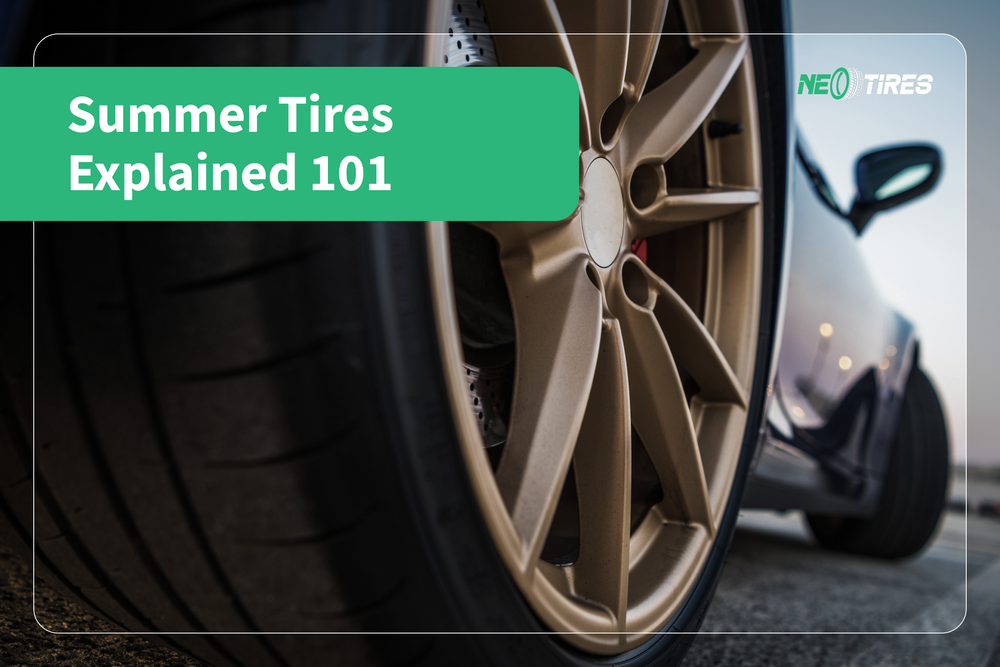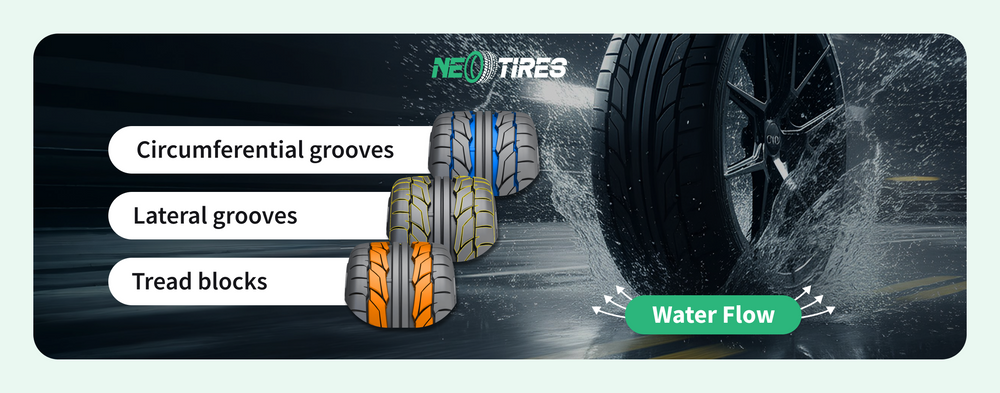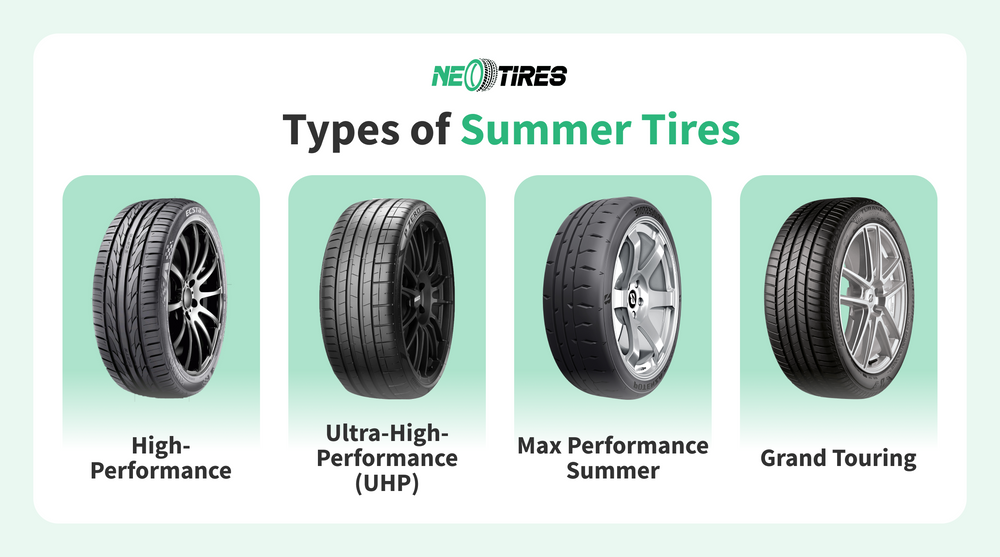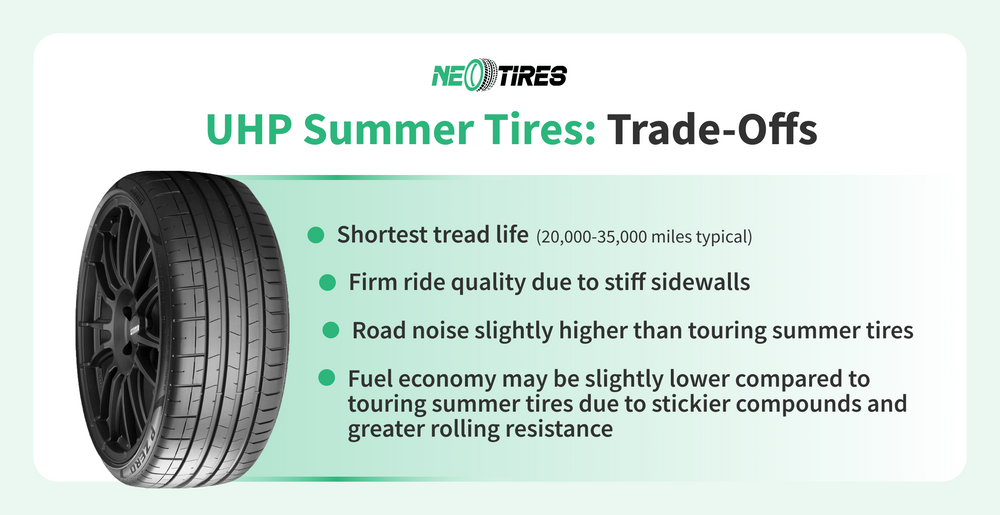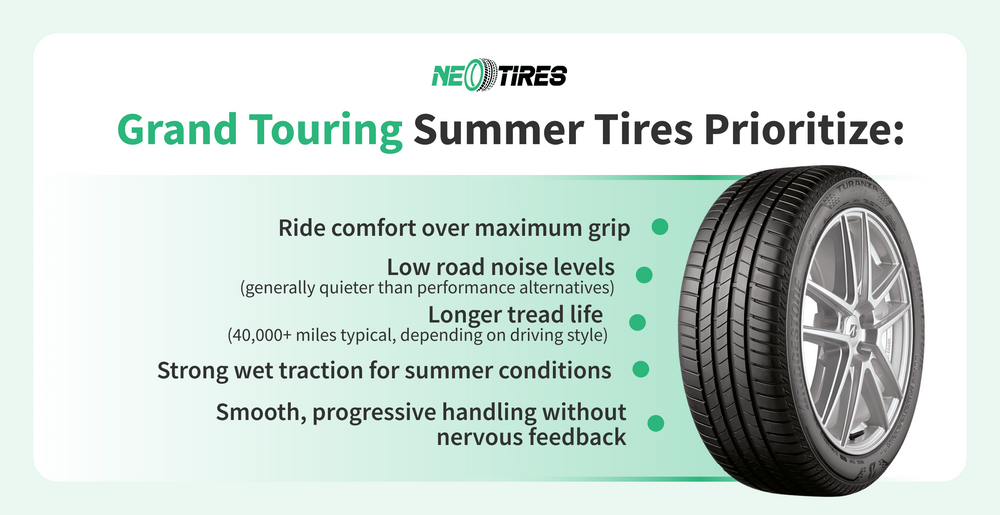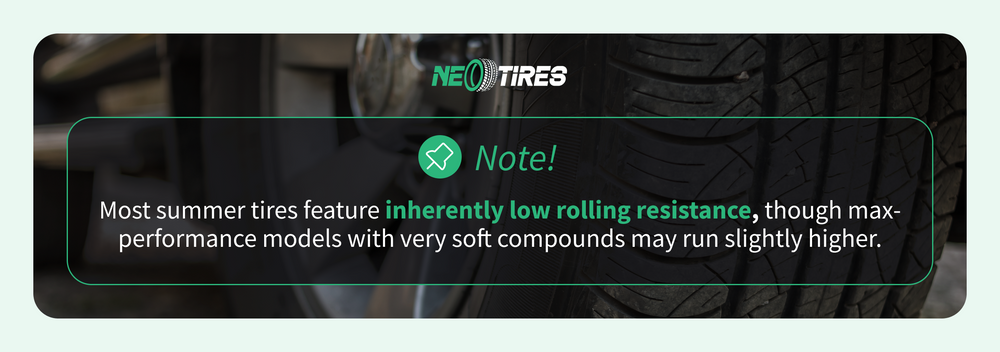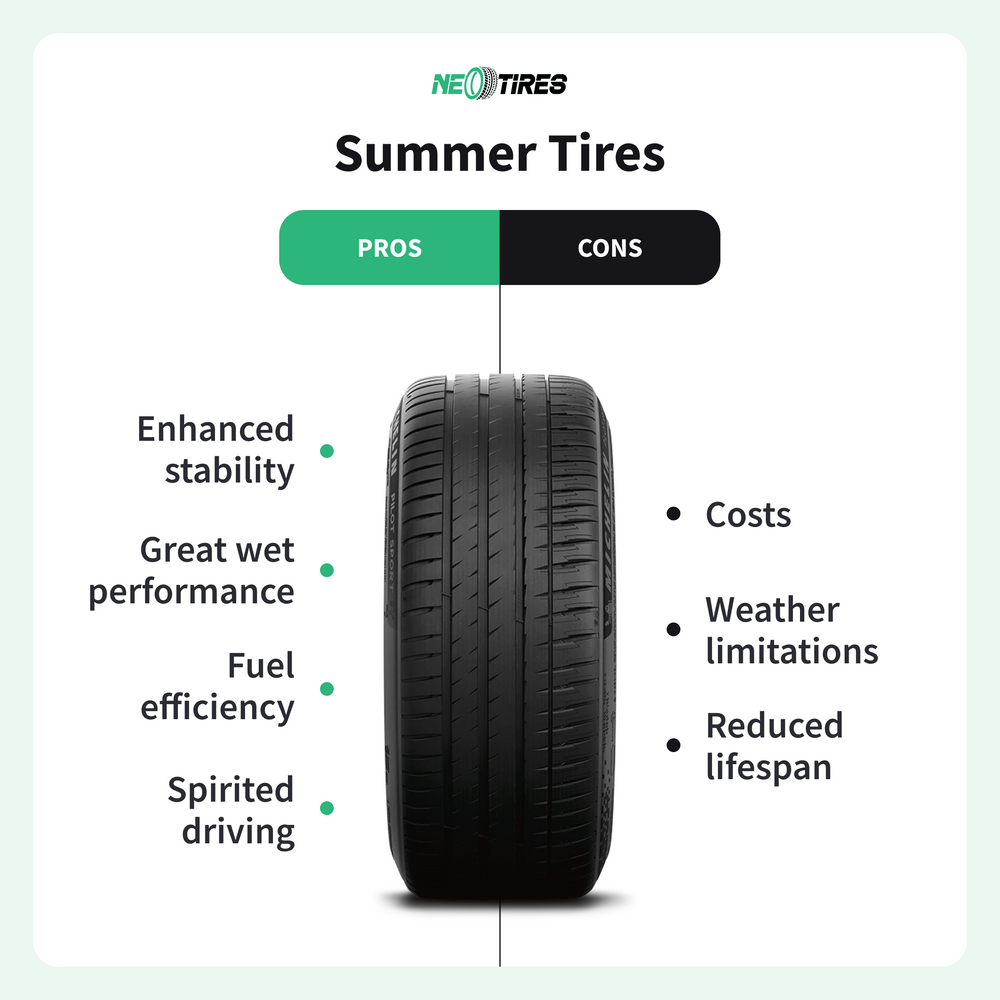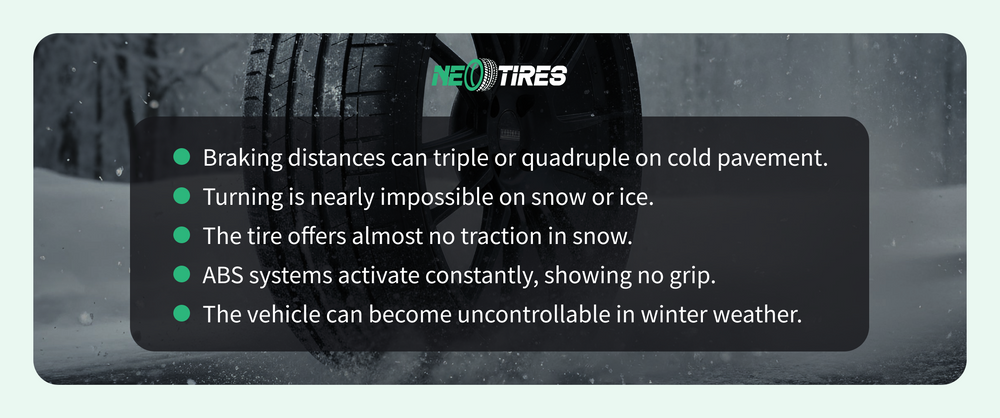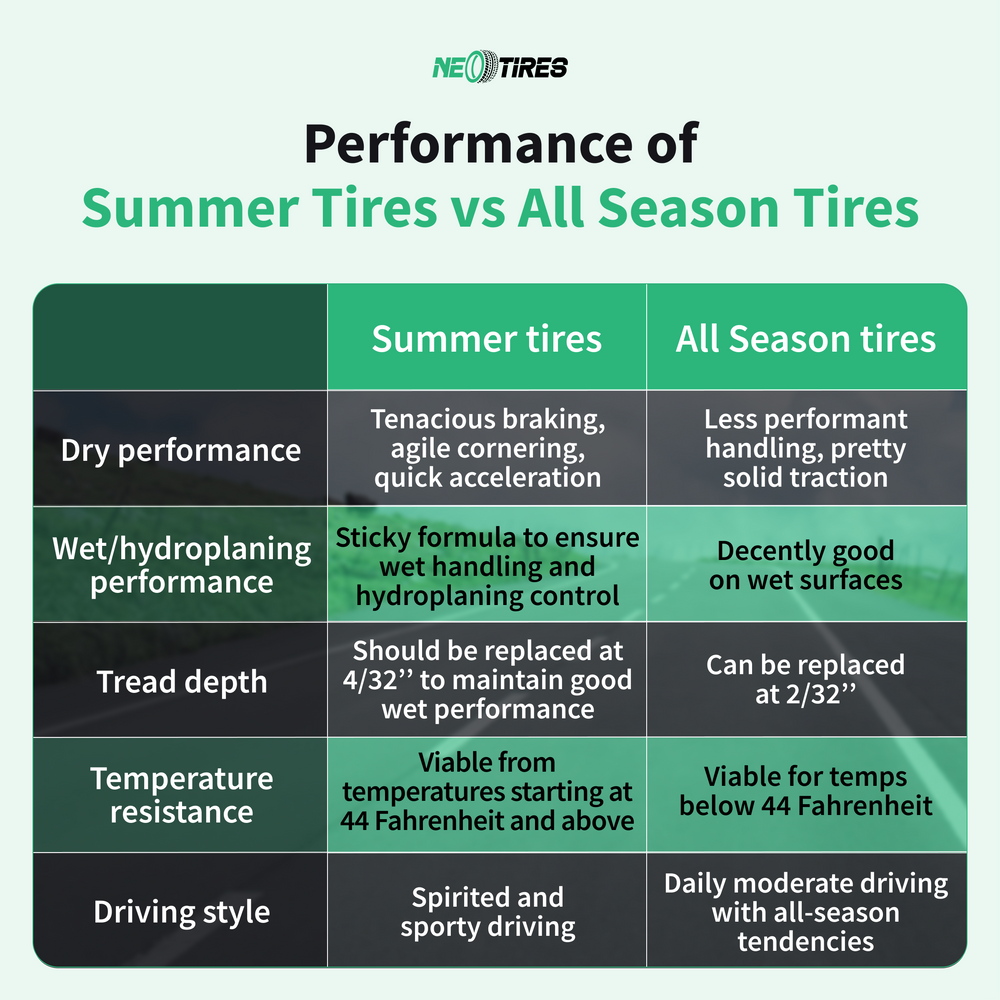Summer tires provide the grip, responsiveness, and braking power needed for driving in warm weather. They are made for temperatures above 45°F. These specialized tires use softer rubber and performance-focused tread patterns that make them perform better than other options in specific areas, but only when the weather is warm.
This guide includes everything you need to know about summer tire technology, performance features, and whether they are the right choice for your vehicle and climate.
What Are Summer Tires?
Summer tires are performance-focused tires engineered exclusively for warm weather driving above 45°F (7°C). Summer tires maximize grip, handling precision, and braking power when temperatures rise.
Construction and Design
Summer tires are engineered around three core elements: warm-temperature rubber compounds, shallow-groove performance tread patterns, and reinforced sidewall construction for sharper handling. Here is the breakdown:
Rubber Compounds
Summer tires are made with blends of rubber, silica, and polymers designed to withstand high heat and maintain grip on the road. These softer compounds stay pliable in warm temperatures while resisting the heat buildup that degrades performance during spirited driving. The silica-enhanced formulation provides the sticky grip that allows summer tires to outperform other tire types on both dry and wet pavement.
Shallow-Groove Tread Pattern
Summer tires use shallower tread depths, generally 7.5 to 9.5 mm. For reference, AS tires generally have a depth of 9 to 11 mm. The tread patterns of summer tires rely on wide circumferential channels for water evacuation and feature fewer sipes, which keep the tread blocks rigid for enhanced cornering and responsiveness.
Sidewall Design
Summer tires typically feature stiffer sidewalls and reinforced shoulder areas to limit flex during aggressive cornering. This construction maintains a stable, predictable contact patch at high speeds. Summer tires often use polyester or nylon plies tuned for rigidity rather than comfort.
Types of Summer Tires
Manufacturers offer several types within the summer tire category, each of them offering different performance levels:
- Max Performance Summer: Track-capable tires with extreme grip (example: Bridgestone Potenza RE-71RS)
- Ultra-High-Performance (UHP) Summer: Aggressive street tires for sports cars (Continental ExtremeContact Sport, Pirelli P Zero)
- High-Performance Summer: Balanced daily-driver performance tires ( Kumho Ecsta PS31)
- Grand Touring Summer: Comfort-focused with longer tread life (Bridgestone Turanza T005, Pirelli Cinturato 7)
Ultra-High-Performance (UHP) Summer Tires
UHP summer tires typically rate with W, Y, or (Y) speed ratings, whereas the W-rated refers to 168 mph maximum speed, Y-rated - 186 mph maximum speed, and (Y)-rated - above 186 mph (performance sports cars).
These speed ratings aren't just about top speed; they indicate the tire's structural integrity and heat resistance at sustained high speeds.
Target Vehicle Types
UHP summer tires are often engineered for:
- Performance sports cars (Porsche 911, Chevrolet Corvette, BMW M cars)
- High-performance sedans (Mercedes-AMG, Audi RS models, Cadillac V-series)
- Exotic supercars (Ferrari, Lamborghini, McLaren)
UHP summer tires are also commonly chosen as upgrades for lightweight track-focused cars like the Mazda MX-5, Toyota GR86, and Subaru BRZ.
Check our full guide on UHP Tires 101 Explained for more details about tradeoffs and performance characteristics.
High-Performance Summer Tires
High-performance summer tires typically rate with V and W speed ratings, whereas the “V” refers to 149 mph maximum speed, and “W” refers to 168 mph maximum speed.
These ratings suit vehicles that may occasionally see triple-digit speeds but aren't designed for sustained high-speed driving.
Balanced Performance Profile
High-performance summer tires strike the ideal balance for enthusiast daily drivers:
- Strong, dry and wet grip suitable for spirited driving, without the harsher ride and shorter tread life of UHP models
- 25,000-40,000 mile tread life expectancy
- Quieter and more comfortable than UHP alternatives
- Mid-premium pricing: $150-250 per tire
- Suitable for spirited driving and light track use, though they are not ideal for extended track sessions.
Target Vehicle Types
High-performance summer tires are often suitable for:
- Sport sedans (Audi A4, BMW 3-Series, Genesis G70)
- Sport coupes (Ford Mustang, Chevrolet Camaro, Nissan Z)
- Enthusiast daily drivers (Mazda3 Turbo, VW GTI, Honda Civic Si. For Honda Civic tire options, check our dedicated guide on Best Tire Options for Honda Civic)
Grand Touring Summer Tires
Grand touring summer tires often feature a comfort-focused design and typically carry H- and V-speed ratings, though some sport-oriented models may reach W ratings. “H” refers to 130 mph maximum, and “V” refers to 149 mph maximum speed.
Performance Profile
Grand touring summer tires prioritize:
- Ride comfort over maximum grip
- Low road noise levels (generally quieter than performance alternatives)
- Longer tread life (40,000+ miles typical, depending on driving style
- Strong wet traction for summer conditions
- Smooth, progressive handling without nervous feedback
Target Vehicle Types
Grand touring summer tires can be standard equipment on:
- Luxury sedans (Mercedes E-Class, BMW 5-Series, Lexus ES)
- Certain premium crossovers with sport packages (e.g., Genesis GV70, Volvo XC60 T8)
- Executive saloons (Audi A6, Cadillac CT5)
Max Performance Summer Tires
Max performance summer tires are at the extreme end of the street-legal spectrum. They bridge the gap between ultra-high-performance road tires and full competition racing slicks. These tires are the most aggressive ones you can legally drive on public roads.
Key specifications
- Speed ratings: Typically (Y) rated (186+ mph)
- Treadwear ratings: 200 or lower (some as low as 100)
- Operating temperature: Designed for high-temperature operation typical of spirited or track driving.
- Tread depth: Shallower compared to grand touring summer tires
- Compound hardness: Extremely soft, almost sticky to the touch
Extreme Grip Characteristics
Max performance tires deliver race-car levels of grip on street-legal tires:
- Lateral acceleration: up to ~1.05g lateral acceleration on dry pavement
- Dry braking: ~100–115 ft depending on vehicle and conditions
- Cornering speeds: Significantly higher cornering capability than typical UHP summer tires.
- Track consistency: Maintain performance through ~20-30 minute sessions
The compound technology uses racing-derived formulations with high silica content and specialized polymers that provide mechanical grip approaching competition tire levels. Some models even benefit from brief heat cycles to optimize performance, similar to racing tire preparation.
Common applications
- Track day enthusiasts who drive to the circuit
- Time attack and autocross competitors
- Sports car owners prioritizing lap times over tire life (Optional choice)
- Performance driving school participants
These tires make sense only for dedicated enthusiasts who regularly participate in track events or competitive driving. For everyone else, ultra-high-performance summer tires provide 90% of the grip with far better daily usability.
Performance Trade-Offs
Max-performance summer tires deliver extreme grip but come with notable compromises:
- Short Tread Life: Typically 15,000 - 25,000 miles; track sessions can wear them down quickly.
- Wet Limitations: Reduced wet grip vs. UHP tires due to shallow tread and heat-dependent compounds; some models struggle in heavy rain.
- Cold Sensitivity: Compounds harden below ~45°F, reducing grip until warmed up.
- Harsh Ride: Very stiff sidewalls and firm compounds transmit bumps directly into the cabin.
- High Cost: $300–$500+ per tire with a high cost-per-mile because of fast wear.
- Increased Noise: Louder than touring or standard performance summer tires.
Summer Tire Types: Table Overview
Tire Type | Speed Rating | Tread Life | Grip Focus | Ride Comfort | Noise Level | Target Vehicles |
Max Performance Summer | (Y) | 15,000-25,000 mi | Extreme grip, track-focused | Harsh | Loud | Track enthusiasts, high-performance sports cars |
Ultra-High-Performance (UHP) Summer | W (168 mph), Y (186 mph), (Y) 186+ mph | 20,000-35,000 mi | Strong dry grip, occasional track use | Firm | Medium-high | Performance sports cars (Porsche 911, Corvette, BMW M), lightweight track cars |
High-Performance Summer | V (149 mph), W (168 mph) | 25,000-40,000 mi | Balanced dry & wet grip | Comfortable | Moderate | Sport sedans (Audi A4, BMW 3-Series), sport coupes (Mustang, Camaro, VW GTI) |
Grand Touring Summer | H (130 mph), V (149 mph), some W | 40,000+ mi | Moderate grip, strong wet traction | Very comfortable | Low | Luxury sedans (Mercedes E-Class, BMW 5-Series, Lexus ES), premium crossovers (Genesis GV70, Volvo XC60) |
Summer Tire Performance Characteristics
Summer tires are known for their excellent handling, steering precision, and braking performance in warm weather. These qualities result from specific materials and tread designs that improve road contact and heat management. This section examines the main performance factors that influence how summer tires perform in everyday driving.
Dry Road Performance
Grip and Traction
Summer tires create grip by using a soft rubber compound to stick to the texture of the pavement. The shallow tread depth results in a larger contact patch, which puts more rubber molecules directly on the road. When you accelerate quickly, these molecular bonds help prevent slipping and efficiently transfer engine power to move the car forward.
The soft rubber also molds to tiny bumps and grooves in the pavement, increasing the real contact area beyond what the tire's size indicates. This ability to conform is why summer tires feel "glued" to the road when compared to harder tire types.
Braking Distance Capabilities
In ideal warm-weather conditions, summer tires can reduce stopping distances by about 10 to 20% compared to other tire types. When driving at 60 mph, this may mean a decrease of around 10 to 20 feet (however, the real difference relies heavily on the tire models, road surface, weather, and tire condition). This advantage comes from two factors: the increased contact patch creates more friction, and the softer compound generates higher friction coefficients.
Cornering Stability Factors
The combination of stiff sidewalls and continuous tread blocks gives summer tires outstanding lateral grip. When cornering forces push the tire sideways, the firm sidewall resists rolling over and keeps full tread contact with the road.
Larger shoulder blocks add extra grip at the outer edge of the tire, where cornering loads focus. This design avoids the common issue of "shoulder rollover" that can be felt with other tire types, where aggressive cornering makes the tire ride on its edge instead of its entire tread face.
Wet Weather Performance
Hydroplaning Resistance
Special grooves in summer tires help prevent hydroplaning by pushing water out from the footprint and keeping surface contact. The wide channels run around the tire, moving water away from the center of the contact area at speeds greater than the vehicle's forward motion.
Modern summer tires can maintain surface contact in standing water up to 70-80 mph before hydroplaning begins, compared to 55-65 mph for worn all-season tires. The threshold depends on tire model, tread depth, water depth, testing condition, and tire inflation pressure.
Water Evacuation Properties
Many summer tires usually have 2 to 4 wide grooves around the tire. These channels can move several gallons of water per second at highway speeds. Lateral grooves that connect the main channels provide additional paths for water to escape, preventing it from becoming trapped under the contact area.
The tread pattern also plays a key role in wet performance. Directional (V-shaped) patterns are particularly effective at channeling water away from the contact patch, while asymmetric and symmetric designs offer a balance between wet traction and tread-block stability. Modern summer tires use computer-optimized layouts to maximize both water evacuation and handling performance. Learn more about tire designs in our dedicated article Tire Tread Patterns | Complete Guide.
Wet Braking Performance
While summer tires perform well in wet conditions, they usually stop 5 to 10 feet longer on wet pavement than on dry when traveling at 60 mph. This distance is still significantly shorter than with other tire types that may need an extra 15 to 25 feet on wet roads.
The soft rubber compound helps the tire maintain grip even on a thin layer of water. Silica in the tread compound improves wet traction by increasing adhesion and helping the tire maintain contact with the pavement
High-Temperature Performance
Heat Resistance Properties
The rubber used in summer tires helps prevent heat from building up in hot weather. Heat-resistant properties allow the tires to perform consistently, even during long periods of high-speed driving. Summer tires are typically made to work well up to 220°F.
The heat resistance comes from special polymers and carbon black reinforcement that keep their structure almost intact at high temperatures. The special formula stops the "chunking" wear pattern, where overheated rubber pulls away from the tread surface.
Thermal Stability Under Load
When cornering hard or braking aggressively, the tire's contact patch can reach temperatures above 250°F. Summer tire compounds are formulated to maintain their flexibility at these temperatures, helping prevent the rubber from becoming sticky or tearing.
The internal belt structure is also important; summer tires often include extra nylon cap plies on top of the steel belts to keep tread stability as heat causes the tire casing to expand.
Performance Degradation Thresholds
Summer tires perform best when temperatures are between 45°F and 100°F. When the temperature goes above 100°F, which is typical in southern states during summer, there is some performance loss, but it is still minimal when compared to other tire types.
The main issue arises when temperatures drop below 45°F. As it gets closer to freezing, the rubber hardens a lot, making it less able to adapt to the road surface. At 35°F, grip can drop by 30-50% compared to grip at 65°F. Similarly, braking distances can increase by about the same percentages.
Summer Tire Advantages
Summer tires generally provide sharp steering response and short braking distances. Here’s a breakdown of the key benefits and their effects on safety, handling, and overall driving experience.
Performance Benefits
Superior Handling Precision
Summer tires offer excellent steering feel. The stiff sidewalls and continuous tread blocks remove the uncertainty found in other tire types. When you turn the wheel, the car reacts right away with smooth, predictable handling.
This accuracy is crucial during emergency situations. If obstacles or debris enter your lane, summer tires provide the traction and quick response to handle the situation. Other tire types often slow the reaction by half a second, which can often mean the difference between avoiding danger and crashing.
Shorter Braking Distances
The 10 to 20-foot braking advantage that summer tires have over other tire types may not seem substantial at first. However, think about real-world situations:
- Highway speed (65 mph): The difference between stopping before a crash or hitting at 25 mph.
- City driving (35 mph): Stopping before the crosswalk versus stopping in the crosswalk.
- Emergency situations: Having space to spare versus hoping you stop in time.
This safety margin is enough reason for many drivers to choose summer tires, especially those with families or who often drive in traffic.
Enhanced Cornering Grip
Summer tires let you keep highway speeds on ramps that are rated 15-20 mph lower. Summer tires stay stable at 50-55 mph, while other tire types may force you to slow down to 40 mph for a 35 mph ramp.
The added grip is not just about speeding; it also gives you a better safety buffer when conditions worsen or surprises happen. If you need to swerve around an obstacle while turning, summer tires help you maneuver without losing control.
Efficiency Benefits
Lower Rolling Resistance
Because most summer tires flex and deform less as they roll, they can lower rolling resistance. This may lead to a 1 to 2% improvement in fuel economy for cars with internal combustion engines. For drivers covering a lot of miles each year, this can result in modest savings at the gas station. For electric vehicles, lower rolling resistance can also slightly increase range, but the exact benefit varies by vehicle type, driving style, and tire model.
Reduced Road Noise Levels
The quieter ride in most summer tires (compared to louder pattern tires) comes from:
- Fewer tread elements vibrating against pavement
- Shallower grooves producing less air turbulence
- Continuous center ribs eliminating the "hum" of block patterns
- Computer-optimized pitch sequencing that cancels harmonic frequencies
- Noise-dampening materials inside the tire, such as foam insert
Safety Benefits
Improved Wet Traction
Summer tires maintain grip on wet pavement that would leave other tire types struggling. The soft compound and efficient water evacuation channels work together to prevent the dangerous condition where a water layer separates the tire from the road.
Better Hydroplaning Protection
The special grooves in summer tires help avoid hydroplaning by eliminating water from the footprint and maintaining surface contact.
Summer tires maintain pavement contact in standing water at speeds 10-15 mph higher than other tire types. For example, all-season tires begin hydroplaning at 60 mph; summer tires won't hydroplane until 70-75 mph in the same conditions.
Predictable Performance Limits
Summer tires offer clear, gradual feedback as you near their grip limits. The tire slowly loses traction instead of breaking loose suddenly. This gradual response gives you a warning and time to react before losing control.
In contrast, other tire types can switch quickly from gripping to sliding, offering little warning. This unpredictable behavior can catch drivers off guard and make it hard to recover.
Summer Tire Disadvantages
While summer tires perform well in warm weather, they come with trade-offs that might not be ideal for every driver. Their sensitivity to temperature, shorter tread life, and lower traction in cold weather can impact safety and practicality. Here are the summer tire limitations so you know what to expect before switching:
Temperature Limitations
Cold Weather Performance Loss
Below 45°F, summer tire grip drops quickly:
- 45°F: Noticeable firmness, slightly longer braking
- 40°F: 20-30% grip reduction, steering feels vague
- 35°F: 40-50% grip loss, dramatically extended braking
- 32°F and below: Dangerous hardness, minimal traction
The rubber's molecular structure changes at low temperatures. The polymer chains that give summer tires their sticky grip become stiff and cannot adjust to the pavement texture. What feels stable and responsive at 70°F becomes slippery and unpredictable at about 35°F.
Winter Safety Risks
Summer tires are not meant to perform in snow. The tread designs and rubber materials in these tires do not work well for grip in cold temperatures. Driving in winter conditions on summer tires can lead to the following dangerous situations:
Rubber Hardening Effects
Cold temperatures make the polymer chains in summer tire compounds contract and stiffen. The tire turns into a hard plastic ring instead of a flexible rubber component. Besides temperature issues, cold weather makes the already hard rubber even more brittle. This increases the risk of tread cracking or chunking if you hit potholes or road debris.
Practical Drawbacks
Seasonal Tire Change Requirements
Living with summer tires means committing to seasonal tire swaps - often, twice per year, every year you own the vehicle. Each swap involves:
- Scheduling appointments weeks in advance during peak changeover periods
- Spending 1-2 hours at the tire shop
- Paying for mounting, balancing, and TPMS reset
- Coordinating timing with weather forecasts
Many drivers find that this inconvenience outweighs the performance benefits, especially if they live in regions with unpredictable weather.
Longevity Concerns
Shorter Tread Life vs All-Season
Summer tires often wear faster than other tire types due to their softer compounds. While all-season tires might last 50,000-80,000 miles, grand touring or high-performance summer tires typically have a tread life of 30,000-50,000 miles, while UHP tires last about 20,000-35,000 miles.
For drivers covering 15,000 miles annually, this means:
- Summer tires: Replace every 2-3 years
- All-season tires: Replace every 4-5 years
Cost Per Mile
A summer tire set that costs, for example, $800 and lasts about 35,000 miles averages to about 2.3 cents per mile. In contrast, a $700 all-weather set that lasts 60,000 miles comes to roughly 1.2 cents per mile.
This comparison is just an example, but it shows a common truth: summer tires generally cost more for each mile driven. This is particularly true when you include the costs of seasonal mounting and balancing, which further raise the total ownership cost.
How Summer Tires Differ From Other Tire Types
Summer tires differ from all-season and winter tires, each category serving a distinct purpose. Understanding these differences is important for choosing the right tire based on climate, driving habits, and performance expectations. Here’s how summer tires compare to winter and all-season tires:
Summer Tires vs. Winter Tires
Summer tires provide stability and control because their rubber firms up in the heat. This is ideal for hot pavement. Winter tires work differently: they use very soft rubber that stays flexible in the cold but becomes too soft and unstable when it warms up.
The deep grooves and dense siping that give winter tires traction in snow also take away some grip on dry surfaces. Summer tires, on the other hand, have shallower grooves and often larger, stiffer tread blocks. This design maximizes contact with the road for dry and wet performance in warm weather only.
Summer Tires vs. All-Season Tires
Summer tires are designed for the best performance in warm and hot weather. Their rubber stays tacky in high temperatures. In contrast, all-season tires use harder rubber that is more stable across temperature ranges. This makes them usable year-round, but sacrifices grip in hot weather.
All-season tread patterns are deeper and blockier, which helps with light snow but decreases handling on dry roads. That is why summer tires offer sharper steering, stronger braking, and better cornering. All-season tires prioritize versatility and comfort.
When to Use Summer Tires
Choosing the right time for summer tires is key to safety. These tires work best when road temperatures rise. Using them too early or too late really lowers grip. This section explains when to put on, use, and take off summer tires for the best safety and performance.
Optimal Temperature Range
Minimum Safe Temperature (45°F/7°C Threshold)
Summer tires are not designed to stay flexible and provide traction during freezing temperatures. The critical transition point is 45°F; the rubber compound begins hardening below this temperature.
At 40°F, you'll experience sluggish steering response and longer braking distances. At 35°F, grip diminishes by 30-40% compared to optimal conditions. At 32°F and below, summer tires become genuinely dangerous, offering minimal traction on cold pavement and virtually none on ice or snow.
Maximum Performance Temperature Range
Summer tires deliver peak performance between 50°F and 95°F. The compound maintains ideal pliability within this range: soft enough to conform to pavement texture but firm enough to resist chunking or tearing.
Between 95°F and 110°F (common in southern states during summer), performance remains strong, though some tires may show slight grip reduction during extended high-speed driving. Above 110°F ambient temperature, only premium summer tires maintain consistent performance.
Temperature | Summer Tire Performance | Action Recommended |
Above 95°F | Optimal performance, minimal heat-related degradation | Continue normal use |
50-95°F | Peak performance range | Ideal operating conditions |
45-50°F | Slight firmness, still safe | Monitor weather forecasts |
40-44°F | Noticeable grip reduction (20-30%), sluggish response | Consider switching tires soon |
35-40°F | Dangerous (40-50% grip loss) | Switch to all-season/winter immediately |
Below 32°F | Extremely dangerous, minimal traction | Never drive on summer tires |
Regional Climate Considerations
Year-round summer tire regions:
- Southern California, Arizona, southern Texas, Florida, Hawaii
- These areas rarely see temperatures below 45°F, making summer-only fitment practical
Seasonal summer tire regions:
- Most of the United States and southern Canada
- Requires switching to all-season or winter tires when cold weather arrives
Not recommended regions:
- Areas with unpredictable cold weather, even in warm months.
- Mountain regions where temperatures can drop suddenly.
- Anywhere that gets unexpected snowfall.
Seasonal Installation Timeline
Spring Installation Timing by Region
- Southern states (Florida, Texas, Arizona): February-March when consistent 45°F+ days arrive
- Mid-Atlantic and Midwest (Virginia, Kansas, Missouri): April-early May after last frost
- Northern states (Michigan, Minnesota, New York): May-early June when nighttime lows stay above 45°F
- Mountain states (Colorado, Montana): Late May-June due to lingering cold snaps
The key indicator is when your 7-day forecast consistently shows nighttime lows above 45°F. At that point, it's safe to install summer tires.
Fall Removal Schedule Recommendations
Switch back to all-season or winter tires when:
- Nighttime temperatures regularly drop below 45°F
- Your first frost warning appears in the forecast
- Typically occurs: September (northern states), October (mid-states), November (southern states)
Don't wait for snow; cold pavement alone makes summer tires unsafe. If you wake up to frost on your windshield, your summer tires are already dangerously hard.
Conclusion: Making Your Summer Tire Decision
Summer tires offer the best performance for warm weather. They provide grip, precise handling, and braking ability that most of other tire types can't match.
Choosing summer tires depends on your situation. If you live in a warm climate year-round, drive a performance car, or need maximum grip in wet and dry conditions, summer tires can significantly improve safety and performance.
However, summer tires require commitment. You need to monitor temperatures closely, switch to other tires when they drop below 45°F, and accept that they can wear out faster than other tires.
Consider summer tires if performance, safety, and driving pleasure matter more to you than the convenience and cost savings of other tire types. Your climate, vehicle type, driving habits, and personal preferences will help you decide whether summer tires are the right fit for you. Make your choice based on an honest assessment of your needs, and you'll pick the tires that best meet your real-world requirements. The NeoTires team can help you with personalized recommendations and a wide selection of summer tires, shipped fast across the United States.
Drive safe and choose your tires wisely!
Resources:
ResearchGate | Influence of tire pressure on the vehicle braking distance
ResearchGate | Experimental Study of Winter Tyre Usage According to Tread Depth and Temperature in Vehicle Braking Performance
Michelin | Summer Tires vs All-Season Tires
Goodyear | All-Season Tires vs Summer Tires
AAA Study Report | Tire Testing




